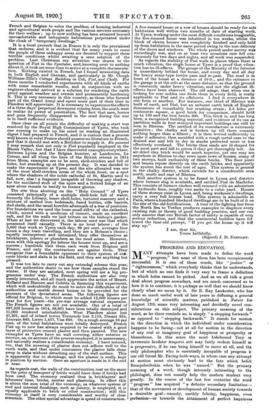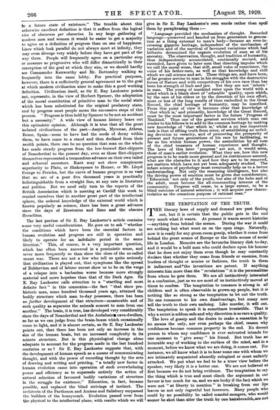PROGRESS AND EDUCATION.
MANY attempts have been made to define the word " progress," but none of them has been conspicuously successful. It is one of those words, like " justice " or " righteousness," which everybody thinks that he understands, but of which no one finds it very easy to frame a definition in which holes cannot be picked. And as we all talk a great deal about progress nowadays, and are much concerned as to how it is to continue, it is perhaps as well that we should know clearly what we mean by it. Sir E. Ray Lankester, who has done so much useful work of late years in diffusing a general knowledge of scientific matters, published in Nature for August 12th some very interesting and decidedly novel con- siderations on this subject. The primary meaning of the word, as he there reminds us, is simply " a stepping forwards " as opposed to " stepping backwards." It stands for motion in the direction in which the individual under consideration happens to be facing—not at all for motion in the direction of any real or imaginary goal of happiness or prosperity or blessedness. In this sense the most hidebound Tory os inveterate laudator temporie acti may fairly reckon himself as a progressive, if he can bring himself to move at all, and the only philosopher who is essentially incapable of progress is our old friend Mr. Facing-both-ways, in whose case any attempt at motion must obviously lead to the fate which befell Rumpelstiltskin when he was " named." But the primary meaning of a word, though intensely interesting to the philologist, does not usually help the modern student very greatly. In the course of the last few centuries the word " progress " has acquired " a definite secondary limitation— that of the movement or development of human society towards a desirable goal—namely, earthly felicity, happiness, even perfection—or towards the attainment of perfect happiness In a future state of existence." The trouble about this otherwise excellent definition is that it suffers from the logical vice of obecurum per obscurius. In any large gathering of modern men and women it would be easier to get a majority to agree on a definition of progress than on one of happiness. Lines which look parallel do not always meet at infinity, they may even diverge very widely before they have got part of the way there. People will frequently agree on a particular step or measure as progressive who will differ diametrically in their conception of the goal at which they aim, or we should hardly see Commander Kenworthy and Mr. Bottomley walking so frequently into the same lobby. For practical purposes, however, there is a sufficiently general agreement as to the goal at which modern civilization aims to make this a good working definition. Civilization itself, as Sir E. Ray Lankester points out, represents, in the view of Herbert Spencer, the adaptation of the moral constitution of primitive man to the social state which has been substituted for the original predatory state, end by progress most people mean the successive steps of this process. "Progress is thus held by Spencer to be not an accident but a necessity." A wide view of human history bears out this optimistic opinion. Although it is true that all the great isolated civilizations of the past—Assyria, Mycenae, Athens, Rome, Spain—seem to have had the seeds of decay within them, to have come to a stand and then declined from their zenith points, there can be no question that man on the whole has made steady progress from the low-brewed flint-chippers of Neanderthal to the present day, even as those flint-chippers themselves represented a tremendous advance on their own tailed and arboreal ancestors. Kant may not show conspicuous superiority to Plato, or Shakespeare to Homer, or Mr. Lloyd George to Pericles, but the curve of human progress is so vast that an arc of a poor five thousand years is practically indistinguishable from a straight line, at any rate in literature and politics. But we need only turn to the reports of the British Association which is meeting at Cardiff this week to remind ourselves that in another great part of the intellectual sphere, the ordered knowledge of the external world which is known popularly as science, there has been a great advance since the days of Erostratus and Zeno and the obscure Heraclitus.
The last portion of Sir E. Ray Lankester's article contains some very useful considerations. He goes on to ask " whether the conditions which have been the essential factors in human evolution and progress are still in operation and likely to operate for an indefinite period in the same direction." This, of course, is a very important question, which has often been answered in a pessimistic sense, and never more frequently so than since the close of the so-called recent war. There are not a few who tell us quite seriously that civilization is played out, that symptoms like the spread of Bolshevism and of labour unrest show us to be on the verge of a relapse into a barbarism worse because more strongly material and more hopeless than that of the Dark Ages. Sir E. Ray Lankester calls attention to a " startling and most definite fact" in this connexion—the fact "that since pre- historic man, some hundred -thousand years ago, attained the bodily structure which man to-day possesses, there has been no further development of that structure—measurable and of
each quality as separates the animals nearest to man from one another." The brain, it is true, has developed very considerably since the days of Neanderthal and the Andalusia* cave-dwellers, so far as we can judge from the brain-boxes which occasionally
come to light, and it is almost certain, as Sir E. Ray Lankester points out, that there has been not only an increase in the
size of the human brain, but an increased complexity in its
minute structure. But is this physiological change alone adequate to account for the-progress made in the last hundred
centuries or so ? Sir E. Ray Lankester suggests that, with the development of human speech as a means of oommunicating thought, and with the power of recording thought by the arts of drawing and -writing and printing, " a totally new factor in human evolution came into operation of such overwhelming power and efficiency as to supersede entirely the action of natural selection of favoured bodily variations of structure in the struggle for existence." Education, in fact, became possible, and replaced the blind strivings of instinct. The
architects of the Parthenon and Amiens and Salisbury surpassed the builders of the honeycomb. Evolution passed over from tthe physical to the intellectual plane, with results which we will give in Sir E. Ray Lankester's own words rather than spoil them by paraphrasing them:— "Language provided the mechanism of thought. Recorded language—preserved and handed on from generation to genera- tion as a thing external to man's body—became an ever-in- creasing gigantio heritage, independent of the mechanism off variation and of the survival of favoured variations which h hitherto determined the organic evolution of man as of his ancestry. The observation, thought, and tradition of humanity, thus independently accumulated, continually revised, and extended, have given to later men that directing impulse which we call the moral sense, that still, small voice of conscience, the voice of his father-men, as well as that knowledge and skill which we call science and art. These things are, and have been, of far greater service to man in his struggles with the destructive forces of Nature and with competitors of his own race than has been his strength of limb and jaw. Yet they are not ` inborn ' in man. The young of mankind enter upon the world with a mind which is a blank sheet of ' educable ' quality, upon which, by the care of his elders or by the direction of his own effort, more or less of the long results of time embodied in the Great Record, the chief heritage of humanity, may be inscribed. From this point of view it becomes clear that knowledge of ` that which is,' and primarily, knowledge of the Great Record, must be the most important factor in the future Progress of Mankind.' Thus one of the greatest services which man can render to his fellows is to add to the common heritage by making new knowledge of ' that which is,' whilst a no less important task is that of sifting truth from error, of establishing an unfail- ing devotion to veracity, and of promoting the prosperity of present and future generations of his race by facilitating, so far as lies within human power, the assimilation by all men of the chief treasures of human experience and thought. The laws of this later progress ' are not, it would seem, those of man's earlier evolution. What they are, how this new progress is to be made more general and its continuance assured, what are the obstacles to it and how they are to be removed, are matters which have not yet been adequately studied. The infant science of psychology must eventually help us to a better understanding. Not only the reasoning intelligence, but also the driving power of emotion must be given due consideration. Education not only of the youth, but also of the babe and of the adult, must become the all-commanding interest of the community. Progress will cease, to a large extent, to be a blind outcome of natural selection ; it will acquire new charac- teristics as the conscious purpose of rational man."



































 Previous page
Previous page